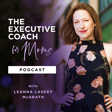
Leading with Impact: Values Based Leadership and Growth Mindset for Working Mothers - Dr. Lesley Robinson (part 2)
In Part 2 of this powerful conversation, Leanna continues her discussion with Dr. Lesley Robinson, entrepreneur, educator, and fierce advocate for women in leadership.
Dr. Robinson unpacks what it really means to lead with a founder-focused mindset—whether you’re building a business or leading from within an organization. She dives into the unique challenges women face in entrepreneurship, the critical need for customer obsession, and the power of building community with purpose.
From navigating funding disparities for women to creating personal advisory boards and networking with values, this episode is packed with real-world wisdom for ambitious women who want to lead with impact, without losing themselves in the process.
🎧 If you missed Part 1, start with Episode 102 for the heart behind the journey, then come back for this deep dive into the mindset and mechanics of empowered leadership.
Full transcript available here.
Connect with Leanna here.
If you're ready for deeper transformation, check out The Executive Mom Reset; Leanna’s six-month coaching program designed to help ambitious moms stop merely surviving and start thriving. Book a consult now!
Be sure to follow, rate, and review the show. It helps more working moms and women leaders find this conversation!

